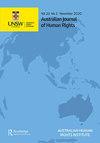Women as outsiders of the law: A review of How many more women? Exposing how the law silences women
Q1 Arts and Humanities
引用次数: 0
Abstract
Atkins, Hoggett, Thornton, Morgan, Graycar, Smart, Bartlett and Charlesworth, among many others, were and continue to be pioneers of their times. They offered a robust critique, in English-language scholarship, of domestic and international law’s failure to find a place for women, but also the tendency for law and legal systems to marginalise, exclude and discount women’s experiences. Decades have passed since some of this early scholarship, but the repetition of Audre Lorde’s caution that, ‘[T]he master’s tools will never dismantle the master’s house,’ at countless gatherings of feminist socio-legal scholars today, is an unnecessary reminder that women remain ‘sister outsiders’, the title of the 1984 book compiling Lorde’s essays and speeches. Perhaps more importantly, Lorde was on the cutting-edge of raising our consciousness about the compounded experiences of discrimination women face, within and beyond the law, based on their multiple identities. Today a plethora of researchers—and I count myself in that circle—continue to take up the baton to demonstrate that sadly little has changed when it comes to the institution of the law. Contributing to and amplifying this agenda, in How many more women? international lawyers Jennifer Robinson and Keina Yoshida seek to depict law’s failure to listen to and to believe the stories of women victims of gender-based violence (GBV). In the words of scholar of gender, peace and security, Jacqui True, GBV ‘is one of the key struggles and法律之外的女性:《还有多少女性?》揭露法律如何让女性噤声
阿特金斯、霍格特、桑顿、摩根、格雷卡、斯玛特、巴特利特和查尔斯沃思,以及其他许多人,曾经是并将继续是他们时代的先驱。他们在英语学术领域对国内法和国际法未能为女性找到一席之地,以及法律和法律体系边缘化、排斥和轻视女性经历的趋势提出了强有力的批评。这些早期的学术研究已经过去几十年了,但在当今无数女权主义社会法律学者的聚会上,奥德丽•洛德(Audre Lorde)的警告——“主人的工具永远不会拆除主人的房子”——被反复提及,这是一个不必要的提醒,提醒人们女性仍然是“局外人姐妹”,这是1984年出版的一本书的标题,该书汇集了洛德的论文和演讲。或许更重要的是,洛德站在了提高我们意识的前沿,让我们意识到,基于多重身份,女性在法律内外都面临着复杂的歧视经历。今天,大量的研究人员——包括我自己在内——继续拿起接力棒,可悲地证明,在法律制度方面,几乎没有什么变化。促进和扩大这一议程,《还有多少妇女?》国际律师詹妮弗·罗宾逊(Jennifer Robinson)和吉田凯娜(Keina Yoshida)试图描述法律未能倾听和相信性别暴力(GBV)女性受害者的故事。用性别、和平与安全学者Jacqui True的话来说,性别暴力是关键的斗争之一
本文章由计算机程序翻译,如有差异,请以英文原文为准。
求助全文
约1分钟内获得全文
求助全文
来源期刊

Australian Journal of Human Rights
Arts and Humanities-History
CiteScore
1.30
自引率
0.00%
发文量
43
期刊介绍:
The Australian Journal of Human Rights (AJHR) is Australia’s first peer reviewed journal devoted exclusively to human rights development in Australia, the Asia-Pacific region and internationally. The journal aims to raise awareness of human rights issues in Australia and the Asia-Pacific region by providing a forum for scholarship and discussion. The AJHR examines legal aspects of human rights, along with associated philosophical, historical, economic and political considerations, across a range of issues, including aboriginal ownership of land, racial discrimination and vilification, human rights in the criminal justice system, children’s rights, homelessness, immigration, asylum and detention, corporate accountability, disability standards and free speech.
 求助内容:
求助内容: 应助结果提醒方式:
应助结果提醒方式:


